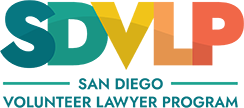Attorney FAQs
Please complete the Volunteer Registration Form to sign up.
SDVLP accepts various types of civil cases, including, Social Security disability, employment, housing, government benefits, guardianship, restraining orders, evictions, immigration for foster/dependent youth (SIJS), family law, special education assistance for foster/dependent youth, and transactional assistance for local non-profits. SDVLP is prohibited from handling criminal cases.
No, in addition to direct representation cases, SDVLP offers a variety of clinics to offer clients brief service and advice. These clinics include domestic violence, civil harassment, unlawful detainer, family law, HIV/AIDS, and guardianship. Please see our Home page for more information on each clinic.
All clients are screened by SDVLP staff. Applicants must be residents of San Diego County and meet certain financial criteria based on household income. Financial eligibility is confirmed by documentary evidence, such as pay stubs and tax returns.
You can donate a few hours at a clinic, or represent a client from the beginning to end. You choose the time commitment that meets your preferences and schedule.
Yes. Any case handled through SDVLP is covered under SDVLP’s primary malpractice insurance.
If you discover that you require such services in a SDVLP case that you are working on, you should contact the SDVLP office immediately. SDVLP may be able to obtain the services you need on a pro bono basis.
Yes, we provide training and supervision. We are an approved MCLE provider by the State Bar of California. MCLEs are offered at no cost to volunteer attorneys or attorneys who agree to take a SDVLP case prior to the seminar. Generally seminars are held on an as needed basis. See the Events section for information on upcoming MCLEs.
Yes. This information is required by our funding sources. We will request your hours and an update on your case every six months.
SDVLP pursues every possible recognition opportunity for our volunteers. The staff nominates volunteers for local and state awards. For 50+ hours of pro bono service, the State Bar of California awards the Wiley W. Manuel award. For 150+ hours of pro bono service, volunteers receive a Distinguished Service Award. In addition, SDVLP recognizes one volunteer each month on its website for his or her extraordinary efforts in providing pro bono legal services.
SDVLP sponsors an annual volunteer reception and an annual awards ceremony to recognize and thank all of the volunteers that participate in the program. SDVLP recognizes that our volunteers are among the most talented and generous people in our community. We make every effort to ensure that the legal community and the general public know about their good works.
Funding for the program is provided by a variety of sources that include grants and private donations. For more information about SDVLP and the SDVLP budget, view our Annual Report.
Law Student FAQs
Please complete the Volunteer Registration Form to sign up.
The SDVLP Staff Attorney provides training for law students whether the student is in-office or volunteering at a clinic. Written materials may also be provided.
Yes, law students work with actual clients.
SDVLP does not offer parking to its volunteers or clients. You may wish to use public transportation.
Professional attire should be worn in the office and at clinics.
Legal skills development: Pro bono participation is an opportunity to work with real clients. This experience enables students to develop a variety of fundamental legal skills that law courses alone cannot teach, such as, problem solving, legal research and analysis, counseling, negotiation, and the recognition and resolution of ethical dilemmas. Having developed such skills, a student can market herself to future employers by demonstrating that she has relevant and practical work experience.
Networking and mentoring: Pro bono work opens the door to these two important career development tools. It helps students build relationships with practicing lawyers who can serve as important contacts for future employment. The supervising attorney can provide helpful feedback to the student.

